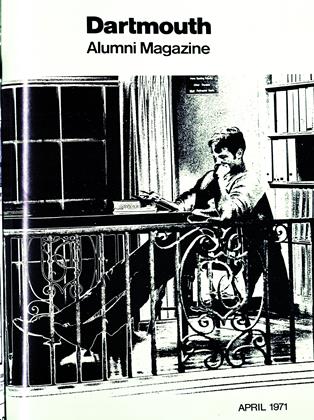"Where is the dollar going?", the question opening the guest editorial in the March 6 Saturday Review, is asked by Courtney C. Brown '26, the George C. Warren Professor of Business at the Columbia Business School and Editor of the Columbia Journal ofWorld Business, "To whom and for what purposes?" He doubts that the value of the dollar will change significantly in terms of other currencies. "Individualism will be progressively abandonded as a way of life, and the disadvantages and unorganized will become more and more dependent." Believing that "inflation is a dangerous psychological sedative," Professor Brown is far from certain that we have the knowledge and courage to keep it under control, for it is now deeply embedded in the political and economic mores of the nation. For the past five years the demon inflation has taken an increasingly large bite out of the consumer's dollar. "When and if we succeed in contracting our extensive military involvement," inflation will make only more difficult the fulfilment of such national goals as the better administration of more ample medical services, an expansion of educational opportunities, and an improved control of the environment.
Gregory Rabassa '44 has translated TheGreen Pope, a novel by Miguel Angel Asturias (Delacorte Press, $8.95), which was reviewed in the New York Times BookReview February 28 by Emir Rodriguez Monegal, Professor of Latin American Literature at Yale University.
Philip Booth '47, the poet, is the subject of a profile by Sheila McKenna in the January-February number of North CountryLibraries.
Sigmund G. Ginsburg '59, Assistant City Administrator in New York City's Office of the Mayor and Director of the Urban Fellowship Program, has contributed a chapter to Up Against New York: AHandbook for Survival in the City, edited by John Berenyi, aged 23. Twelve of the 13 contributors, men and women, black and white, urbanites and small towners, are under 30. Devoted to broad aspects of city life, the first half of the book comments on bureaucratic red tape, the Upper East Side mystique, laymen's guides to the law, landlords and politicians, and the problem of meeting people. "A Survival Kit for New York," the second half lists alphabetically essential facilities and sources of information such as where to arrange for an abortion and how to lodge a complaint involving the rights of tenants and demonstrators. The publisher is William Morrow & Co., Inc.
 View Full Issue
View Full Issue
More From This Issue
Books
-
 Books
BooksESQUIRE FASHION GUIDE FOR ALL OCCASIONS.
May 1958 -
 Books
BooksGREATER LONDON: THE POLITICS OF METROPOLITAN REFORM.
JUNE 1965 By H. WENTWORTH ELDREDGE '31 -
 Books
BooksBriefly Noted
APRIL 1969 By J.H. -
 Books
BooksUNDER THE ROCK, POEMS FROM A VALLEY.
JANUARY 1968 By JOHN HURD '21 -
 Books
BooksNotes on a common bond: the federal city, that summer in Philadelphia, Essex County in revolt, and disaster in Ohio
September 1976 By R.H.R. -
 Books
BooksThreading the Maze
June 1980 By Robert H. Ross ’38







